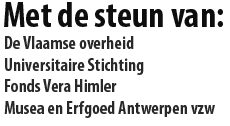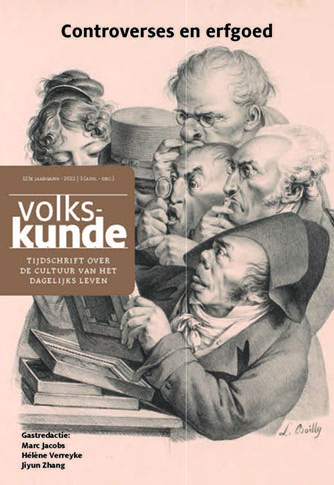Heritage in the 2020s: adjectives,
Controversies and Agonistic value
Marc Jacobs, Hélène Verreyke & Jiyun Zhang
In the introduction to this special issue of Volkskunde on heritage and controversies, the urgency and
relevance of this topic in the 2020s are emphasized. The wave of symbolic violence and protests against statues
of persons linked with slave trade or colonization (illustrated with the case of the Melville Monument in Edinburgh) in the 2020s, was fuelled by the Black Lives Matter Movement, in particular after the death of George Floyd in 2020. The
expansion and proliferation of the concept of heritage in the 21st century, well beyond only monuments and statues, is accompanied by an expansion of controversies. An extended series of adjectives like dark, difficult or toxic has recently been introduced in museology and critical heritage studies to draw attention to problematic aspects of heritage,
memories, and tourism. This is contextualized by problematizing and addressing historical and contemporary events, traumas, and development. This is not only the case for slavery, imperialism, racism, colonialism, and gender relations in the past but also for climate change, sustainability, and anxieties about the future(s). These agendas and new
challenges have effects on education, in particular history and history didactics. This field is now confronted with strong political attempts at orientation and reframing (as the attempts to launch a selective canon trajectory in Flanders demonstrate).
But resilience can be expected, just like strategies of multiplication of perspectives, stories, canons, and frames. In the last five years, several projects were launched by Paul Janssenswillen en Wil Meeus, focusing on the topic of controversies in heritage (organizations) and teaching history, emphasizing multiperspectivity and the need for
tools and didactic frames. This even leads to an article in this journal Volkskunde, published in 2019. One of these projects, the REGER project, bumped halfway into the COVID-19 pandemic and the subsequent lockdowns and other problems in 2020 and 2021. But as the present volume demonstrates, literature reviews and numerous experiments
were realized in the second phase.
Some results are published in this special issue. Confronted with the pandemic’s impact and several evolutions, a reorientation of the trajectory of the project led to the discovery of controversy mapping and its application in high schools and higher education in France.
Many other promising lines are explored, including the legacy of the late Bruno Latour, the work of Tommaso Venturini and Anders Kristian Munk and the potential of thinking in terms of “Streitwert” (agonistic value), as launched by Gabi
Dolff-Bonekämper.
Keywords: controversial heritage, dark heritage, statues, Black Lives Matter, iconoclasm, controversies, canon, didactic frames, multiperspectivity, heritage education, controversy mapping, Streitwert, agonistic value, actor-network theory.
Orcid: https://orcid.org/0000-0002-5967-3053 (Marc Jacobs); https://orcid.org/0000-0003-2900-1528
(Hélène Verreyke); https://orcid.org/0000-0001-5997-7682 (Jiyun Zhang)
Heritage: dissonant, Dark, Difficult, Painful, Shameful, Toxic, Contested … About Problematizing Adjectives
Vic Bervoets & Marc Jacobs
In this selective review of recent scholarly literature in museum and (critical) heritage studies, a whole series of adjectives linked to the concept of heritage (or memory) are presented and interpreted: dissonant, dark, difficult, painful, shameful, toxic, contested. The importance of several protagonists like Gregory Ashworth and John E.
Tunbridge (dissonance), Tony Seaton (thanatourism), John Lennon and Malcolm Foley (dark tourism), Suzie Thomas (dark heritage), Sharon MacDonald (difficult heritage), William Logan and Keir Reeves (painful difficult heritage), Laurajane Smith (emotional heritage) and Gustav Wollentz (toxic heritage, difficult heritage), is highlighted.
A flood of adjectives, including “controversial” keeps on coming, for instance in the leading International Journal of Heritage Studies. We suggest considering the use of “controversies” (as an eye- or can-opener, in the sense controversies mapping and actor-network theory are exploring the concept) and going beyond the limitations of attaching adjectives to the concept of heritage.
Keywords: controversies, dissonant heritage, controversial heritage, dark heritage, difficult heritage, toxic
heritage, critical heritage studies Orcid: https://orcid.org/0000-0002-2197-6489 (Vic Bervoets); https://
orcid.org/0000-0002-5967-3053 (Marc Jacobs)
Contact Zones, Participation, Agonism and Difficult Heritage: The Impulses from the Field of New Museology
Vic Bervoets, Hélène Verreyke & Marc Jacobs
In this review article, we first investigate the impact of a volume edited by Peter Vergo, New Museology, on the discourse and practice of museums and the role they can play in society. Are museums already or still contact zones as James Clifford proposed? How far can this metaphor be pushed, as Robin Boast advocated? Critical changes are needed, according to Bruno Brulon Soares. Furthermore, the handbook, understand website, The participatory
museum by Nina Simon had a major impact in promoting better use of museums as community spaces and
participatory models. Graham Black added emphasis on conversation and social interaction: facilitating taking
part, corrective response, belonging, empowering and taking action. Agonism is the path recommended by Chantal Mouffe. Moreover, this proposal was further developed and operationalized by Anna Cento Bull and Hans Lauge Hansen in the model of agonistic memory.
Keywords: museums, controversies, new museology, contact zones, participation, participatory museums,
agonism, agonistic memory
Orcid: https://orcid.org/0000-0002-2197-6489 (Vic Bervoets);
https://orcid.org/0000-0002-5967-3053 (Marc Jacobs); https://orcid.org/0000-0003-2900-1528 (Hélène
Verreyke)
Transmit to Future Generations? Asbestos: from Magic Mineral to Toxic Heritage
Hélène Verreyke, Doris Blancquaert & Joeri Januarius Belgium used to be known as an ‘Asbestos champion’. Hence,
there are many objects containing asbestos in heritage collections in Belgium today. In practice, heritage
professionals face many questions on how to conserve and manage these asbestos objects. This is caused by a
combination of different factors, such as the gap in the current legislation, a lack of research on the long-term
conservation of asbestos objects and questions regarding the dismantling of asbestos in objects. Existing methods to determine heritage value also fall short in the case of materials that pose a serious health risk and where there are different, sometimes conflicting perspectives among heritage communities. The asbestos history and the traumatic results of Belgium’s champion status surfaced only recently. Today, there are still different perceptions of the health
risks caused by asbestos. In short, this creates a standstill in heritage management processes because there is no conclusive roadmap on how to deal with asbestos heritage objects in collections. A new project aspires to make a difference.
Keywords: asbestos, toxic heritage, heritage value, trauma, Belgium, health risks, controversies.
Orcid: https://orcid.org/0000-0003-2900-1528 (Hélène Verreyke); https://orcid.org/0000-0003-2412-1862 (Doris Blancquaert); https://orcid.org/0000-0002-9257-8947 (Joeri Januarius)
Controversial heritage and Antisemitism: The Sacrament of Miracle in Brussels
Pieter Rodts
This article explores the link between heritage, antisemitism, and controversies. It discusses the material traces in the city of Brussels referring to a medieval legend of the Sacrament of Miracle, including stained glass, plaques, and buildings. Several opinions about the link between heritage and antisemitism are reviewed. How problematic are the remaining relics and traces in the city of Brussels and even in a building where among others a library of the European Commission is based? Should this be explicitly addressed or rather problematized?
Keywords: heritage, Brussels, Sacrament of miracle, antisemitism, stained glass
Orcid: https://orcid.org/0000-0003-4201-7348 (Pieter Rodts)
The Crime of Witchcraft, a Straw Figure in Slave Trade and the Robbers Gang of Jan de Lichte among the Ancestors. Dealing with Dark Heritage and the Potential of Contemporary Genealogical Resources
Dirk Jacobs & Marc Jacobs
The World Wide Web and digitization have strongly improved the possibilities to search and find.
What happens if applying these tools to your family history, leads to the discovery of several ancestors with controversial stories? Think for instance about unexpected stories, ranging from connections to the slave
trade in the 18th century, an ancestor connected to a famous gang of 18thcentury highway robbers like Jan
de Lichte, or a woman condemned and executed after accusations of witchcraft. It raises many questions, but also the challenge for your family or heritage (project): if you do your homework and research, and look far enough, you will find many shades of heritage or genealogies.
Keywords: genealogy, incredible genealogies, family history, dark heritage, witchcraft, pardons, slave trade, Bruges, gang, robbers, controversies
Orcid: https://orcid.org/0000-0002-6079-8427 (Dirk Jacobs); https://orcid.org/0000-0002-5967-3053 (Marc Jacobs)
Intangible Controversial Heritage. The split in the UNESCO Dozen Ethical Principles, the Utility of a Toolbox and More “Unless”
Marc Jacobs & Jiyun Zhang
In the set of twelve ethical principles in the Basic Texts of the 2003 Convention for the Safeguarding of the Intangible
Cultural Heritage (UNESCO), a split is identified between the relative autonomy of communities, groups & individuals and their living heritage on the one hand and global and other interventions to transform the world and address a wide range of issues on the other hand. This is analyzed by reshuffling the order of the ethical principles of safeguarding intangible heritage. The potential and necessity of developing an accompanying online platform and
toolkit on the UNESCO.org website, as explicitly requested in 2015 by the Intergovernmental Committee of the 2003 UNESCO Convention, are emphasized. These instruments are discussed in a broader exploration of challenges as expressed in the concept of intangible controversial heritage, in and beyond Flanders.
The experience with the evolving strategies of GAIA, the animal welfare activist NGO, going for “no, unless” was quite instructive. Furthermore, the article starts with a comparison of the ethical challenges for museums as expressed in the heated debate about the ICOM museum definition in 2019-2022 with the (mixed reactions on the) sticky climate actions in art museums.
Keywords: UNESCO, 2003 Convention, safeguarding intangible heritage, ethical principles, anthropology, folklore
studies, controversial heritage
Orcid: https://orcid.org/0000-0002-5967-3053 (Marc Jacobs); https://orcid.org/0000-0001-5997-7682 (Jiyun Zhang)
Critical Proximity.
The Field Guide of Controversy Mapping (2022) by Tommaso Venturini & Anders Kristian Munk and the Legacy of Bruno Latour
Marc Jacobs
This article reviews the new book Controversy Mapping: A Field Guide, in the light of the topic of this special issue linking controversies, actor-network theory, heritage and (higher) education. It also spotlights the connections with the fields of European ethnology, folklore studies and the study of intangible cultural heritage in the work of the editors Anders Kristian Munk and Tommaso Venturini. Furthermore, the importance of narratology, and the oeuvre of Algirdas Greimas, is highlighted. Moreover, the oeuvre of Bruno Latour who passed away in 2022 is discussed, in particular how
he used controversies for teaching and research. Concepts like “critical proximity” and “critical zone” are presented as useful. In the Field Guide an interesting research model, in the form of making controversy atlases is presented. Furthermore, other tools and procedures for doing research and mapping controversies are selected for the toolbox of transdisciplinary heritage studies and education.
Keywords: Controversy mapping, actor-network theory, cartography, European ethnology, heritage studies, narratology, Greimas, Bruno Latour, critical proximity
Orcid: https://orcid.org/0000-0002-5967-3053 (Marc Jacobs)
From Forccast to controverses.org: the Heritage Files
Marc Jacobs
In Forccast a series of projects inspired by controversies mapping and other techniques of actornetwork theory and studies of the science of technologies, in particular the oeuvre of Bruno Latour (1947-2022) and collaborators like
Tommaso Venturini, were conducted in universities, university colleges and other institutions in France in the previous decade. Several results were shared on www.controverses.org. In this contribution, several results from those exercises, case studies focusing on recent controversies related to heritage, were identified and discussed. The topics ranged from authentication of works of art (in particular related to Caravaggio), debates on the restitution of heritage to African countries, the attacks on statues in 2020 and the connections with (de)colonization, and even old and recent controversies on plans for (re)constructing a tower on the Saint-Denis Cathedral. They are presented as eye-opener exercises and as good examples of a broad interpretation of the nexus of research education.
Keywords: controversy mapping, Bruno Latour, decolonization, restitution
Orcid: https://orcid.org/0000-0002-5967-3053 (Marc Jacobs)


